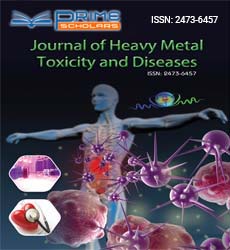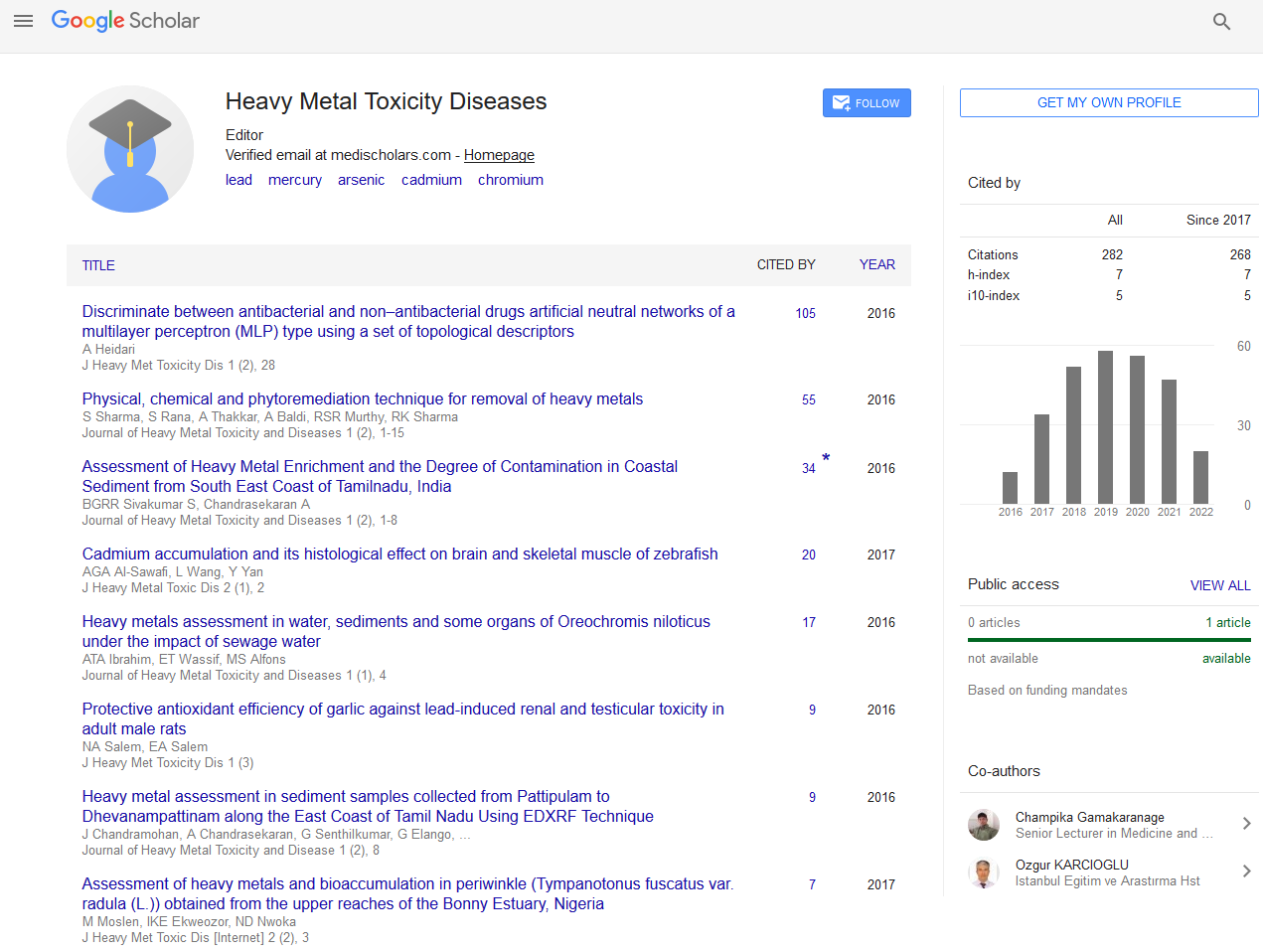Commentary - (2024) Volume 9, Issue 3
Unraveling the Legacy of Heavy Metal Exposure: Epigenetic Inheritance and Disease Susceptibility
Jackson Robert*
Department of Public Health, University of Gothenburg, Sweden
*Correspondence:
Jackson Robert,
Department of Public Health, University of Gothenburg,
Sweden,
Email:
Received: 29-May-2024, Manuscript No. ipjhmct-24-20640;
Editor assigned: 31-May-2024, Pre QC No. ipjhmct-24-20640 (PQ);
Reviewed: 14-Jun-2024, QC No. ipjhmct-24-20640;
Revised: 19-Jun-2024, Manuscript No. ipjhmct-24-20640 (R);
Published:
26-Jun-2024, DOI: 10.21767/2473-6457.24.3.30
Description
Heavy metals, pervasive in our environment due to industrial
activities, mining, and pollution, pose significant health risks
to populations worldwide. Beyond immediate health effects,
emerging research suggests that exposure to heavy metals
can induce epigenetic changes that persist across generations,
potentially increasing susceptibility to diseases even in
individuals not directly exposed. This article explores the evolving
understanding of how heavy metals influence epigenetics and
the implications for public health and environmental policy.
Epigenetics refers to changes in gene expression that do not involve
alterations in the underlying DNA sequence. These changes can
be influenced by environmental factors, including exposure to
heavy metals such as lead, mercury, cadmium, and arsenic. Heavy
metals can disrupt normal cellular processes by altering DNA
methylation patterns, modifying histone proteins, and affecting
non-coding RNA expression. These epigenetic alterations can
lead to dysregulated gene expression and cellular dysfunction,
contributing to various diseases and health outcomes. Research
indicates that epigenetic changes induced by heavy metals can
be inherited across generations through both maternal and
paternal lines. This phenomenon, known as transgenerational
epigenetic inheritance, suggests that offspring of individuals
exposed to heavy metals may inherit altered epigenetic marks
that predispose them to diseases later in life. For example,
studies have observed transgenerational effects of lead exposure
on neurodevelopmental disorders and cardiovascular diseases
in descendants of exposed individuals. Epigenetic modifications
in germ cells (sperm and eggs) of exposed individuals can be
transmitted to offspring, influencing gene expression patterns
in subsequent generations. Maternal exposure to heavy metals
during pregnancy can affect fetal development and induce
epigenetic changes in the developing embryo, potentially
impacting health outcomes in offspring. Environmental exposures
can influence parental behavior and caregiving practices,
which in turn may affect offspring health through epigenetic
mechanisms. Epigenetic modifications acquired during early
development or in response to environmental stimuli can persist
in somatic cells (non-germline cells) and contribute to disease
susceptibility across the lifespan. Incorporating epigenetic
biomarkers into health surveillance programs can improve early
detection and monitoring of disease risks associated with heavy
metal exposure. Enhancing risk assessment frameworks to
consider transgenerational epigenetic effects can better inform
regulatory decisions and preventive strategies for managing
environmental contaminants. Implementing measures to reduce
exposure to heavy metals, such as improving occupational safety
standards, enhancing environmental monitoring, and promoting
clean energy technologies, can mitigate health risks across
generations. Raising awareness about the potential long-term
health impacts of heavy metal exposure and transgenerational
epigenetic inheritance can empower communities to advocate
for policies that promote environmental stewardship and
sustainable practices. Despite advances in understanding
epigenetic inheritance, several challenges remain in elucidating
the complex interactions between heavy metals, epigenetics, and
disease susceptibility: Further research is needed to unravel the
specific mechanisms by which heavy metals induce epigenetic
changes and their implications for disease development
across generations. Collaboration between epidemiologists,
toxicologists, geneticists, and environmental scientists is essential
to integrate findings from different disciplines and translate
research into effective public health strategies.
Acknowledgement
None.
Conflict Of Interest
The author states there is no conflict of interest.
Citation: Robert J (2024) Unraveling the Legacy of Heavy Metal Exposure: Epigenetic Inheritance and Disease Susceptibility. J Heavy Met Toxicity Dis. 09:30.
Copyright: © 2024 Robert J. This is an open-access article distributed under the terms of the Creative Commons Attribution License, which permits unrestricted use, distribution, and reproduction in any medium, provided the original author and source are credited.

